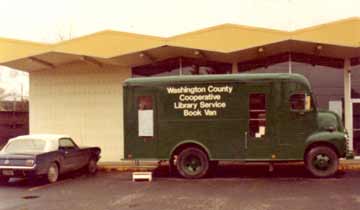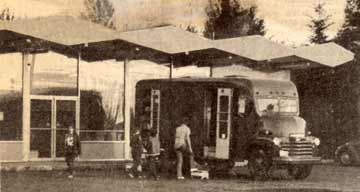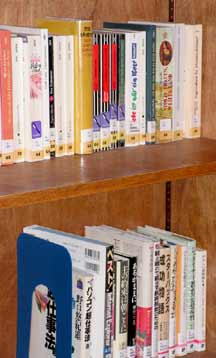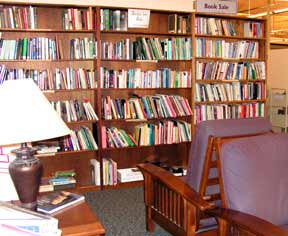 |
Previous Issues |
| Cedar Mill Community Website |
|
| About Cedar Mill News |
|
||||||
| Volume 5, Issue 1 | January
2007
|
|||||
Featured Business
|
 |
| The "Jolly Green Machine" served book lovers in Cedar Mill before the library opened. It was parked in front of the former 7-11 on 107th. |
“The 7-11 store near us was moving from their building at 107th and Cornell, (now a pre-school) and we thought that it could be a library. So Alan VanVeen and I began to recruit for a Board of Directors to form a non-profit corporation,” says Jack Thurber. “I talked to other parents at Cedar Mill School, and started attending the newly-formed CPO1, and we managed to put together a group with varied talents and backgrounds. Once we had the IRS non-profit status, we began to raise money.”
7-11’s parent company, the Southland Corporation, offered to let the Cedar Mill Community Library (CMCL) store books in the building while they raised the money to buy it. Multnomah County Library lent an old bookmobile, dubbed the “Jolly Green Machine,” that was parked in front of the building from October 1975 until mid-January 1976. One of their first big membership activities was the Ice Cream Social in November 1975 that brought in 1000 donated books and served 800 ice cream cones.
 |
| Another view of the book van from a newspaper article |
However it had become obvious that they weren’t going to raise enough money to buy the building in time, and Odus Bales, founder of the Bales Thriftway stores, offered a space in the Milltowner Shopping Center at Saltzman and Cornell. The grocery store occupied the building that now houses Walgreens, and the library moved into the space that’s now Pacific Agricultural Lab. “He rented us the space at $400 per month and then donated $200 of that back to the library, which was well below the market rate. And we realized that we were much better off renting rather than owning a building,” says Thurber.
Through a big volunteer effort over 3000 books were loaded up and moved a mile west to the new facility. The library opened on January 13, 1976 with about 8000 books, all donated, and was run by an all-volunteer staff. In May of that year, a levy succeeded that formed the Washington County Cooperative Library Service (WCCLS). This provided support, both logistical and financial, to the independent non-profit CMCL.
Volunteer at Cedar Mill Community LibraryHere are just a few of the jobs needing volunteers. For more information, contact Kevin Kelley at 503-644-0043, x. 111 or KevinKe@wccls.lib.or.us
Second Edition needs volunteers in many areas:
|
Fundraising was an ongoing issue, and once again Odus Bales stepped up with an idea – how about a rummage sale? Dubbed M.E.S.S. (Misc Etc Super Sale) the first one was held in the breezeway between the library and the grocery store, and brought in around $1000. This annual event eventually spilled out into the parking lot and continued into the ‘90s. “We were the third largest rummage sale in the area, behind Catlin Gabel and Lincoln High,” Thurber recalls.
In 1987, Jack Thurber, Sue Peterson (Conger), Mary Packer, Fran Harkins and others began to research a permanent resale shop to support the library. “We made a spreadsheet factoring ten characteristics of successful shops, including the “x-factor”—spirit and dedication. I gave us a ten on that one,” recalls Thurber. Their research gave them the ability to negotiate a loan from the Association board and to project income into the future. In 1988 a space was carved out of the west end of the library building and Second Edition Resale Shop was born.“We made 10-15% over our initial projections during the first year. It has been a very successful operation,” says Thurber, who still volunteers with his wife Georgie. He’s one of the SPUDDs (Super Pickup and Delivery Dude) who take unsold donations to a Portland charity.
By summer of 1977, the volunteers at the library got some professional help. With the aid of a CETA grant (Comprehensive Employment and Training Act) they hired Kathy Mann, who had just received her Masters in library science from the University of Oregon, as Library Director. The funding also allowed the hiring of a Library Aide.
From this important step of hiring its first paid professional, the library has grown to 50 paid staff (30 full-time equivalent). But the volunteer tradition continued as it does today. Currently 515 people actively volunteer in the library, donating around 40,000 hours a year.
 |
| Peter Leonard, Library Director, welcomes suggestions from patrons on ways to improve the library |
In 1978 the library moved into part of the space it currently occupies, also owned by Bales. The 4800 square foot space more than doubled the library’s area. In 1988 the library expanded again, tripling its size to 15,400 feet. In 2001, the 8000 square foot second story was added. Financing for the expansion was provided by Bales for Food, Inc. The library pays for the expansion through a 15-year lease that began in July 2001. The expansion houses offices and other administrative space and the large divisible Community Room.
Peter Leonard is the current Library Director. Before coming to Cedar Mill, he worked at the Carnegie Library of Pittsburgh and was the director of the Mt. Lebanon, Pennsylvania library. He and his wife enjoy hiking and outdoor activities, and had always thought they’d like to live somewhere in the west. He says, “I wasn’t actively looking for a new job, but when I saw the job posting on the Internet, Cedar Mill seemed like a perfect fit for my background. It was a community-oriented library with strong services and committed staff and volunteers.” He and his wife live within walking distance of the library and he often “commutes” on foot.
Currently open 59 hours per week, the library is the largest non-profit association library in the state (and reportedly the largest west of the Mississippi) and is governed by a Board of Directors elected annually by the Cedar Mill Community Library Association (CMCLA). Residents of the Cedar Mill area pay property taxes to the county library system, but unlike city libraries, pay no additional taxes to provide added support for the library. Membership donations and fundraising activities of CMCLA, comprised of approximately 1000 individuals and families, provide the rest of the library’s funding.
 |
| There is a section of non-English books for adults near the tapes |
Cedar Mill Community Library is one of the fastest growing libraries in the county, serving an area of nearly 50,000 residents. More than 22,000 people now hold Cedar Mill Library Cards. The library provides over 190,000 items in its collection and more than 300 periodical subscriptions. The library ranks second for circulation among individual libraries in the county. In the current year, more than 1.3 million items were checked out of the library representing an 8% increase over the prior year. The library’s current operating budget is $1,820,000, with $1.5 million coming from the County.
The recently passed levy will allow the library to restore cuts in book budgets and to purchase much-needed computers for public use. More than 90% of the computers in use now are more than five years old, with unreliable components. The library will also able to stay open Friday evenings once again, and there will be some interior improvements, including reorganizing the reference area. “People are using the library in new ways, partly because of new media,” says Leonard. “25% of our circulation is now self-checkout. Many people rely on our computers for their internet access.”
With the planned expansion of the Bethany area, Leonard envisions a Bethany branch of the Cedar Mill Community Library. “We’d like to work with developers to create a space for a library that would be run by volunteers. We’re hoping that people in the area will stand up and support such a move.”
In the late 1990s one of the library employees put up the first website. Peter Leonard had secured the “cedarmill.org” domain so that the site could be a community service for more than just the library. When the employee moved on, the site languished for a while.
I am a website designer by trade, and I found out about the site from Sue Conger when we served together on a Park District committee. I volunteered to bring the site up-to-date and Leonard agreed. That first design, launched in 2000, worked for a couple of years, and then the library was becoming so much more complex that we did a complete redesign in 2002. Dawn Anderson, Assistant to the Director, now does most of the updating of the library site (cedarmill.org/library). We’re currently working on revamping the Adult Services section of the site, and Children’s Services is next.
On the
site, you can search for books, request books from other libraries
in the system through the “WILI-net” system that connects all
of the WCCLS libaries, renew books, read the monthly newsletter,
donate, and find out everything you need to know about library patronage.
Coming soon will be a “Library-to-Go” program that will let you
download books and video files that will expire after a set time.
Leonard would like to see the site become more interactive. Online book club
discussions, anyone?
 |
| Reading with your children is a great way to prepare them for literacy |
“We involved children a lot in the early days of the library,” recalls Thurber, whose daughter went on to get a degree in library science. Today children often come in and work with their parents as volunteers. The library is a popular place for high school students to put in their needed community service as well.
The library has always had an emphasis on activities for children and families. “Early literacy is one of our strongest programs,” Leonard says. This includes two sessions a week of “Baby Time;” “Lap Time” for one-to-two-year-olds twice a week with around 60 lap-sitters per session; “Toddler Time” for two-to-three-year-olds six times per week, 20 per session; and the Preschool Story Time twice a week for about 30 kids each time. The library also sends books out to local daycare homes and facilities.
A new program for “reluctant readers” called “Read to the Dogs,” pairs young readers with trained dog-and-handler teams, and helps children develop their reading skills in a relaxed, non-judgmental environment. Parent Workshops offered in January will focus on the developmental stages of three age groups (0-2, 2-3, 4-5), giving parents information and ideas to help them incorporate early literacy skills into their children’s daily activities.
The library has a large collection of children’s books in languages other than English to serve our growing immigrant population. Leonard explains that “it’s important to have parents reading to their kids at an early age, and it doesn’t matter what language the books are in. It helps to get kids ready for school.” Titles are in Chinese, Korean, Hindi, Swahili, and dozens of other languages.
 |
| Volunteer Coordinator Kevin Kelley chats with a couple of volunteers readying books for re-shelving. |
Volunteer Coordinator is an important position at the library. Victoria Eggleston filled the post for several years, and was instrumental in building and retaining the volunteer staff. She moved on last September to become Manager of Volunteer Services for Northwest Medical Teams. Kevin Kelley took over the post in November. She knew Eggleston through their membership in Northwest Oregon Volunteer Administrators Association, of which Eggleston is currently the president. “It’s great, because I can call her whenever I have a question,” says Kelley.
There are dozens of different types of volunteer jobs at the library, and something to suit every personality and time commitment. (see sidebar). Kelley says, “We always need more people in circulation. We have a good reputation for getting books back on the shelf quickly, and that depends on lots of volunteers. It’s fun work, especially for people who like books.”
Volunteers are recognized in numerous ways by the library. There is a volunteer dinner in the fall, and every time a volunteer puts in another 100 hours, they get to choose a book to add to the library that will bear a bookplate with their name on it. New volunteers get a badge and an orientation program that introduces them to library staff and their new job.
Jack Thurber says, “We are proud of our very competent staff and our enthusiastic corps of volunteers. If there are any ‘secrets’ to the success of this library, perhaps the greatest would be the way the staff and volunteers blend so well to serve the community.”
There are many ways that you can support the library. You can become a member with any level of donation, and donations at the “Reader” level ($25) and above receive a variety of benefits (cedarmill.org/library/support.html). You can become a “Supporting Donor” by setting up an automatic debit with your bank. Secure donations may be made online, or call the library at 503-644—0043, ext. 121 for more information. Donations of stock, bequests and other forms of planned giving are welcome. Last year someone donated a very nice car that was sold to raise funds.
 |
| A cozy lounge area in the front of the library houses the ongoing book saleÑbring a book, buy a book! |
In addition to these programs, the library conducts several fundraising events, including the Plant Sale in the spring. But the major ongoing fundraiser for the library is Second Edition Resale Shop. We’ll cover the shop in a subsequent issue of The News.
Another way you can support the library is by donating books. If you just can’t wait to read the latest best-seller, bring it to the library when you’re finished. They often like to have several copies of popular books, and will add them to the collection. Last year around $100,000 worth of donated books were put into circulation! Even paperbacks and older books are welcome donations. Many of them are placed into the Book Sale area in the lobby and the proceeds support thte library. What they don’t want—encyclopedias, damaged books, older computer books.
Leonard feels that the large role played by volunteer workers and donors is part of the strength of the Cedar Mill Community Library. “It gives people a feeling of ownership in the library. This is an exciting place. Sometimes I walk out of my office and see 25 volunteers, ten staff people and 100 customers in the building. It’s a real center of the community.”
Cedar Mill Business Association
Published monthly by Cedar Mill Advertising & Design
Publisher/Editor:Virginia
Bruce
503-629-5799
12110 NW West Rd
Portland, OR 97229